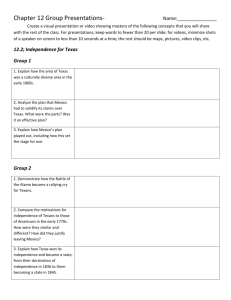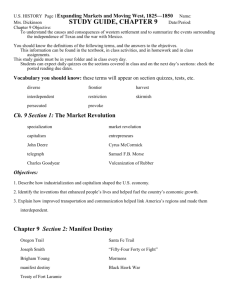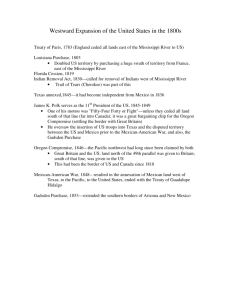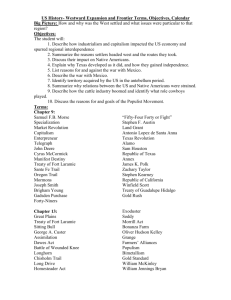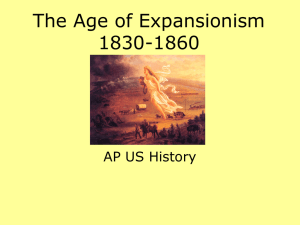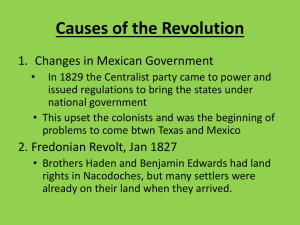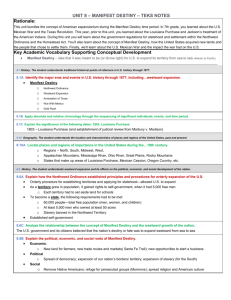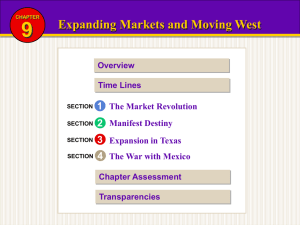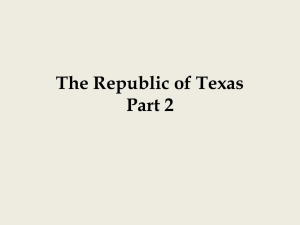Territorial Expansion
advertisement
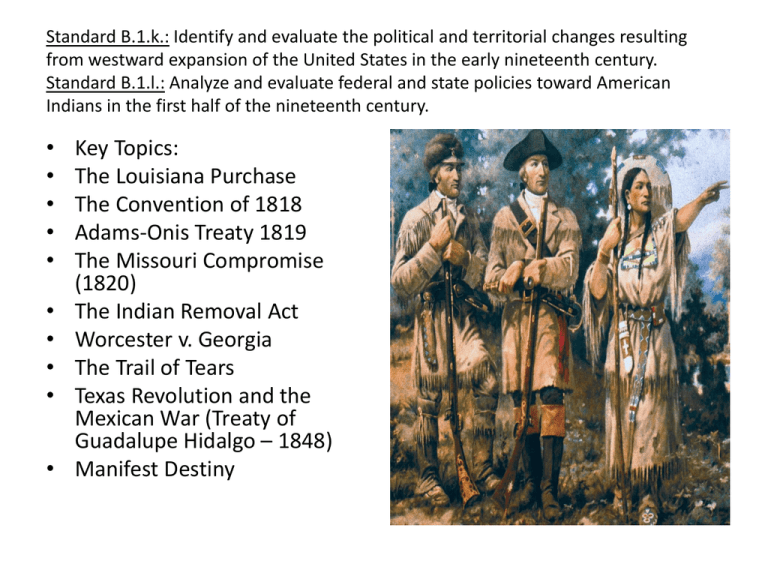
Standard B.1.k.: Identify and evaluate the political and territorial changes resulting from westward expansion of the United States in the early nineteenth century. Standard B.1.l.: Analyze and evaluate federal and state policies toward American Indians in the first half of the nineteenth century. • • • • • • • • • • Key Topics: The Louisiana Purchase The Convention of 1818 Adams-Onis Treaty 1819 The Missouri Compromise (1820) The Indian Removal Act Worcester v. Georgia The Trail of Tears Texas Revolution and the Mexican War (Treaty of Guadalupe Hidalgo – 1848) Manifest Destiny What official act(s) provided for the settlement of the land between the Appalachian Mountains and the Mississippi River, its governance, and its eventual inclusion into the US? - Two ordinances passed in 1785 and 1787 (during the Articles of Confederation) - Settlers pushed into the Old Northwest where Native Americans still lived. - land ordinance of 1785 and Northwest ordinance of 1787. Why did President Jefferson decided to purchase Louisiana from the French, despite his admission that he did not have the Constitutional authority to do so? In 1801 Spain and France signed a secret treaty giving Louisiana to France. France suddenly was a threat to America and if America did not purchase Louisiana, it could lead to war. What factors promoted a surge of settlers into the Old Northwest following the War of 1812? A westward surge, the end of the war in 1812 was followed by a westward surge to the Mississippi river that populated the old northwest (Ohio, Indiana, Illinois, Michigan, and Wisconsin) and the old southwest (Western Georgia, Alabama, Mississippi, Louisiana) Between 1800 and 1820, the nations population almost doubled, increasing from 5.3 million to 9.6 million. The most important reason was because the attractive price of western land. What motive guided the establishment of the Ohio Confederacy under the leadership of Shawnee brothers Tecumseh and “the Prophet”? They began to weld together a farflung confederacy of all the tribes east of the Mississippi, inspiring a vibrant movement of Indian unity and cultural renewal. Their followers gave up textile clothing for traditional buckskin garments. What were the results of President Jackson’s assertion that allowed States’ authority to extend their laws over American Indian lands? Congress passed an act called the Indian removal act. The Indians didn’t think it was right so they refused and fought the government in the courts. In 1832 the supreme court ruled that they couldn’t invade Cherokee land. Jackson said that they need to enforce the act. The Cherokees had to move west. Who were the Five Civilized Tribes, and where were they eventually pushed? The five civilized tribes are Cherokee, Choctaw, Chickasaw, creek and Seminole. The tribes were pushed to the west. How did Americans end up in Texas, what was the Texas Revolution, what memorable statement is associated with the Texas Revolution, and what was the end result? - Mexico offered a lot of benefits if they settled in Texas. For example they were given peace, inexpensive land, and also they were exempt from paying taxes for 10 years. What was the Texas Revolution? - When the American settlers (Anglos) revolted due to cultural differences, like how Anglo brought over slaves but Mexico abolished slavery in 1829 and the language difference (English and Spanish). What memorable statement is involved in the Texas Revolution? - “remember the Alamo” What was the end result? - a war with Mexico as well as eventually the purchase of California, New Mexico, and Texas. Describe the arguments for and against Texas annexation (from Congress, from the North, from the South) and explain what ultimately led President Polk to provoke the war with Mexico). - The North was against because there was more land for slavery and the South would gain political power. - The South was for it more land for slavery and cotton. South would gain political power. - President Tyler is for it. Manifest Destiny president Polk for it for Manifest Destiny. - Congress passed Texas annexation. What were the terms of the Treaty of Guadalupe Hidalgo (1848)? - Mexico agreed to the Rio Grande as the border between Texas and Mexico and ceded the New Mexico and California territories to the U.S. - The U.S. agreed to pay $15 million for the Mexican cession, which included present day California, Nevada, New Mexico, Utah, most of Arizona, and parts of Colorado and Wyoming. Manifest Destinythe 19th century belief that the United States would inevitably expand westward to the Pacific Ocean and into Mexican and Native American territory.
